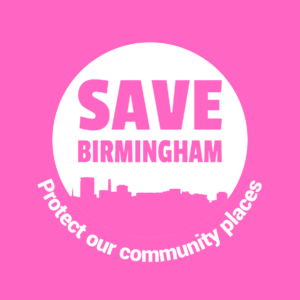Assets of Community Value (ACVs) are recognised buildings or places that further the social wellbeing or social interests of their local community, now and in the future. If they are put up for sale, the local community has the right to try to buy them.
See our YouTube channel for our latest learning sessions on ACVs.
Does your Birmingham neighbourhood have potential Assets of Community Value?
ACVs: how they work
Under the Localism Act 2011, community groups and citizens can nominate certain local public or privately owned buildings (or land they feel is significant) for recognition as an ACV.
If the local authority (council) accepts the nomination, it will include the ACV on a register of such assets for five years.
During this time, if the asset’s owner wishes to sell it, they must, with a number of limited exceptions, inform the local authority.
In turn, the local authority will notify the local community of the proposed sale.
At this point, the community can tell the authority that it wishes to bid for the asset. This enacts the part of the Localism Act 2011 known as the ‘Community Right to Bid’. It triggers a moratorium (a legally authorised delay) of six months – during which time the ACV cannot be sold. So the community has time to see if it can raise funds to buy the ACV.
- Watch our video: What is an Asset of Community Value? How do I register an ACV in Birmingham, UK?
- See also: ‘What are Assets of Community Value?’ on the MyCommunity website from Locality.
Having an asset listed as an ACV does not require the owner to sell the asset at less than market value. Nor does it require the owner to sell the asset to any particular group. It simply gives people a chance to keep, in public use, the buildings that matter most to their local community.
![]()
What makes a place a potential ACV?
With a few exceptions, any building or land can be defined as an ACV if its main use in the recent past, including present use, has been to further the social wellbeing or social interests of the local community, and it is likely to do so in the future (usually for the next five years).
‘Social interests’ can include recreational, sporting and cultural interests.
Some buildings cannot be listed as ACVs, such as hotels and private homes. But many can.
![]()
Assets of Community Value in Birmingham
Birmingham has a list of registered ACVs. These include community centres, church halls, communal land and even football stadia.
You can view Birmingham City Council’s Assets of Community Value Register here.
We can and should add more. Birmingham City Council welcomes ACV nominations from any community organisation, including:
- Neighbourhood forums
- Parish councils
- Community interest companies (CICs)
- Community groups with at least 21 members on the electoral register and where the group is un-constituted
- Charities or other non-profit organisations.
![]()
How do we nominate a Birmingham place as an ACV?
See ‘How to nominate an Asset of Community Value’ from Birmingham City Council.
Here is Birmingham City Council’s Assets of Community Value nomination form.
We also have an ACV nomination form template especially for members of Birmingham Open Spaces Forum (BOSF). In it, we have included notes, guidance and example answers that you can use or adapt, to make it easier for you to nominate the Birmingham park or open space that your group looks after. We updated the template in February 2024.
Birmingham City Council has a legal duty to consider and determine all nominations. It must do so within eight weeks of receiving all information relevant to a nomination. A panel of independent officers will consider the nomination and ensure that there is no conflict between professional duty and legal obligations.
The council welcomes questions and nominations from groups in relation to any asset within the community that can be considered to meet the ACV criteria.
If you would like to know more, send your questions to NDSU@birmingham.gov.uk.
![]()
Save Birmingham: a campaign to protect our community places
Save Birmingham is a non-political campaign, started by Co-operatives West Midlands, in response to Birmingham City Council’s effective bankruptcy and concerns that the council may need to sell off assets to balance its books. We are pleased to be a partner of Save Birmingham.
Learn more about Save Birmingham, become a member, sign up the newsletter and see the nominations so far: go to the Save Birmingham website.
![]()
How else can Birmingham Community Matters (BCM) help with Assets of Community Value?
We have held sessions with Birmingham City Council’s Neighbourhood Development and Support Unit, exploring ACVs and Community Asset Transfer – a different mechanism that allows community organisations to take on a long lease of a publicly owned building.
You can watch the recording of one of these (held in October 2023):
Above is the recording of the full ACV and CAT session. We have also edited it into smaller chunks, in case you want to home in on a particular aspect:
- What is an Asset of Community Value? How do I register an ACV in Birmingham, UK?
- Completing your Assets of Community Value application: hints and tips
- Community Asset Transfer and Community Ownership Fund.
![]()
More tools for you
Neighbourhood Planning
Something else that may interest you is Neighbourhood Planning. Alongside Locality and Birmingham City Council’s Neighbourhood Development and Support Unit, we created the Neighbourhood Planning Toolkit for Birmingham, called Local Visions.
Community Ownership Fund
The £150m Community Ownership Fund is for communities across the UK to help them to take ownership of assets at risk of closure. It is running until March 2025. Check out these resources from My Community, which is also running themed webinars to help you make a strong application.



